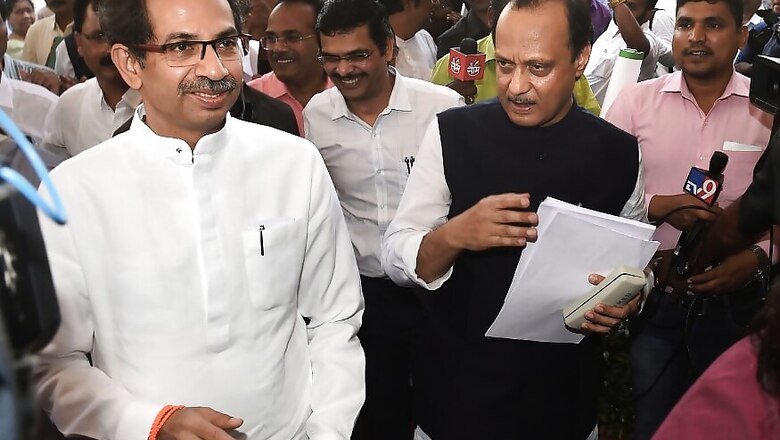Maharashtra Budget Brings Focus on Bal Thackeray's Nativism Plank, But There's a Catch in the Agenda

views
It has been repeated ad nauseam that the Shiv Sena-Nationalist Congress Party (NCP)-Congress led ‘Maha Vikas Aghadi’ government in Maharashtra is an alliance of disparate, unlikely partners.
As the largest party in the government, the Shiv Sena, whose president Uddhav Thackeray has made a maiden transition into electoral politics as Maharashtra’s chief minister, has a lot to gain or lose in this situation.
The Shiv Sena is all the more cagey when confronted with a political and social reality — the rising wave of majoritarian assertion due to controversies such as the Citizenship Amendment Act (CAA) and National Register of Citizens (NRC).
This polarisation and consolidation may work to the favour of estranged ally Bharatiya Janata Party (BJP) but has led to trepidation in the ranks of the Shiv Sena, which has espoused Hindutva more militantly in Maharashtra, thanks to its rough-and-ready character.
Hence, the Maha Vikas Aghadi seems to have fallen back on an old trick — using one thorn to extricate another. The government seems to be using an agenda of nativism and linguistic assertion to counter the BJP’s hyper-nationalist plank.
On Friday, which incidentally marked the regime’s 100 days in office, deputy chief minister and finance minister Ajit Pawar presented the government’s first budget. This budget has promised a law to ensure that locals gets priority in employment in the private sector.
“The state government is making all out efforts to encourage development of new industries in the state. However, at the same time, it is also the policy of the state government to give priority to the local candidates (sic) for jobs in these industries. The Government intends to make a comprehensive law in this regard by correcting the flaws in the existing policy,” said Pawar in his budget speech.
Jobs for sons of soil is an old demand of the Shiv Sena, which was launched in 1966 with this agenda. The Shiv Sena’s birth was the culmination of a campaign launched by the late party chief Bal Thackeray and his younger brother Shrikant in their cartoon weekly ‘Marmik’ against Maharashtrians being deprived of livelihood opportunities. The party sought locals get preference in at least 80 per cent jobs in industries and the private sector.
After its launch in 2006, the Maharashtra Navnirman Sena (MNS), which is headed by Uddhav’s estranged cousin Raj, put the Shiv Sena on the back foot for a while by taking on this plank.
Successive state governments have been issuing notifications from time to time to ensure the implementation of the 80 per cent jobs for locals rule. Though the first notification to ensure priority to locals (a person domiciled in Maharashtra for 15 years) in 80 per cent jobs dates back to 1964, there is near unanimity that implementation on the ground is tardy. The state also lacks an enabling mechanism to ensure that the norm is implemented.
With the economic downturn hitting home hard — around 14,787 industrial employees in Maharashtra have lost their jobs in 2017-18, the fiscal after the demonetisation of high-value currency notes — competition for access to jobs and resources will intensify.
Maharashtra, the most urbanised and industrialised state in India, is also expected to grow at a slower 5.7 per cent in 2019-20. But, this is marginally better than the Indian economy (5 per cent).
While Uddhav and Pawar have refused to comment on the nature of the new law, opposition leaders such as former finance minister Sudhir Mungantiwar note that the budget has reiterated an existing provision. Maharashtra has an estimated 2 crore unemployed.
The state government has also made it clear that it may not hesitate to lock horns with the Centre.
In his budget speech, Pawar, who is seen as the alpha male of the government due to his upfront nature and caustic tongue, has charged that Maharashtra’s share in central taxes has reduced from Rs 44,672 crore to Rs 36,220 crore in the revised estimates for 2019-20. Therefore, the amount that the state would get from the central government has decreased by Rs 8,453 crore.
Pawar also said there is a delay in devolution of Goods and Services Tax (GST) compensation from the central government to the state. This was affecting the spending on developmental works in Maharashtra.
However, there is a catch in the Maha Vikas Aghadi’s nativist agenda.
The Shiv Sena, and later, the MNS, have traditionally charged that the influx of economic migrants from northern, Hindi-speaking states have deprived local Maharashtrians of employment opportunities, especially in the burgeoning informal sector. These migrants stand an economic advantage and hence, work at cheaper rates.
The Congress, and to a lesser extent, the NCP, rely on the North Indian votes, which are significant in areas like Mumbai and the larger Mumbai Metropolitan Region (MMR). Since 2014, this cohort has migrated to the BJP. The Congress, which once had strong pockets of support in these communities, is eager to regain its position.
Hence, the Maha Vikas Aghadi’s policy focus on nativism may have to walk the jagged edge to ensure that it does not degenerate into a local version of xenophobia due to the competing forces involved.
(Dhaval Kulkarni is a Mumbai-based journalist and author of ‘The Cousins Thackeray: Uddhav, Raj and the Shadow of their Senas.’ Views are personal.)

















Comments
0 comment